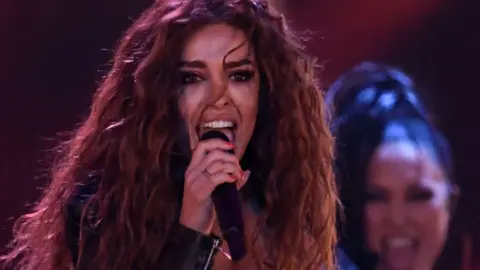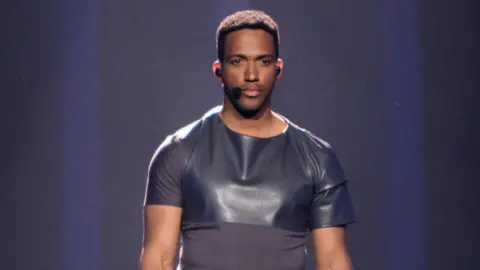Eurovision 2018: 'I'll keep competing with myself till I die' says Netta
So it was the relatable Netta from Israel who won this year's Eurovision rather than Cyprus' glamorous Eleni.
Eurovision proved once more that it embraces the outsider, the person who doesn't fit in.
It follows Conchita Wurst's victory in 2014 and, before her, that of Dana International in 1998.
Netta told BBC News that she came to realise that she was "different" because of her size and found out that "different is often not accepted".
This is why, as she lifted her winner's trophy, she said: "Thank you for choosing different."
Netta stood out in this year's competition right from the beginning.
 AFP/Getty
AFP/GettyIn the weeks leading up to the contest all the buzz was about the Israeli entry. But in the past few days, her star seemed to have waned in favour of Cyprus' hair-flicking Eleni Foureira.
Certainly among the press, Netta had been almost written off - with Cyprus, France, Ireland and Italy thought to be the more credible acts.
By the half-way point in the scoring, though, the national juries had confounded this and she was in a strong third position.
And then for the public vote - where the 25-year old gained enough points from viewers at home to move into first and take the Eurovision crown.
They had seen someone who was fun and quirky but who also carried a meaningful and substantial message of accepting who you are.
Not even close
In 2018, Netta's victory feels particularly deserved following the #MeToo and #TimesUp movements. Eleni - all credit to her - was perhaps just too beautiful, too slick and too mainstream.
In the end, the vote wasn't even that close: Eleni's 436 points to Netta's 529.
Netta said the competition wasn't against Eleni, but was about challenging herself.
"I'll keep competing with myself till I die," she said in an interview following her win.
Aside from Netta's win, outside the Altice Arena all fans wanted to talk about was the stage invasion during SuRie's performance for the UK.
SuRie had her microphone snatched out of her hand as she was mid-song, leaving her unable to perform for 15-20 seconds.
In response, Eurovision fans rallied around SuRie, giving her the biggest cheer of the night, and imploring her to carry on.
And that she did gamely, finishing her song powerfully, but visibly shaken. She was offered the chance to perform again, but declined.
Portuguese colleagues tell me they felt ashamed at that moment, that they had let SuRie down, after months of her preparing for these three minutes on stage.
Nothing political
Whether or not the event had any effect on the vote is hard to tell. The jury votes are already cast the night before the grand final, so this hitch would not have been taken into account at all.
Perhaps the UK gained a few more votes from the televote, but it was still to be 24th place out of 26.
Swedish commentator and Eurovision 2016 organiser, Edward af Sillen, told me that it's nothing personal or political against the UK.
"It's all about the song," he says. "This year's entry (Storm) was not the best, but the BBC is moving in the right direction.
"It's never too late," he says. "We are just waiting for you to enter the right song, and when that happens Eurovision will be so happy for you."
 Getty Images
Getty ImagesOne of the major upsets of the night came in the guise of Austria's Cesar Sampson, which the UK jury was the first of many to award 12 points to. There had been no buzz around this act whatsoever.
Nobody But You is a nice enough song, and Cesar has a rich, warm voice - but it just didn't seem to stand out among the other entries.
And yet. And yet it led at half time, once all the jury votes were in. Sampson himself said he couldn't believe it.
Once all was said and done it ended up in third place - an incredible result, although Sampson actually came second last year when he performed as a backing singer for the Bulgarian entrant.
I don't think he'll be too upset though.

Follow us on Facebook, on Twitter @BBCNewsEnts, or on Instagram at bbcnewsents. If you have a story suggestion email [email protected].
